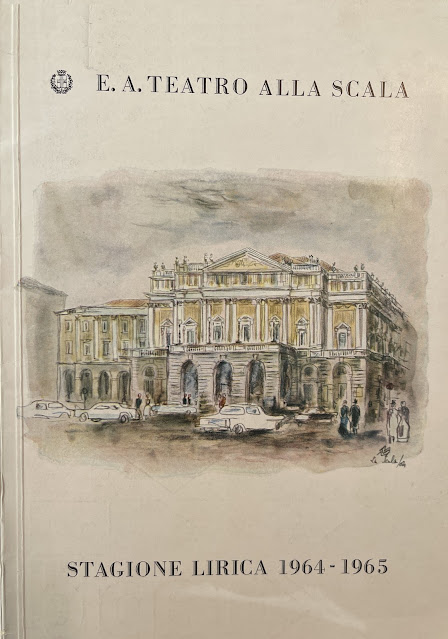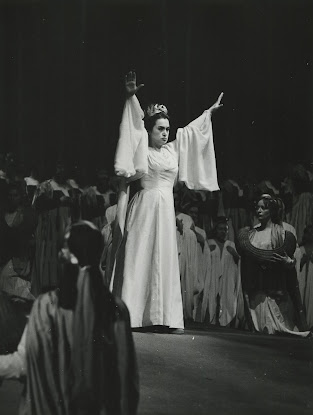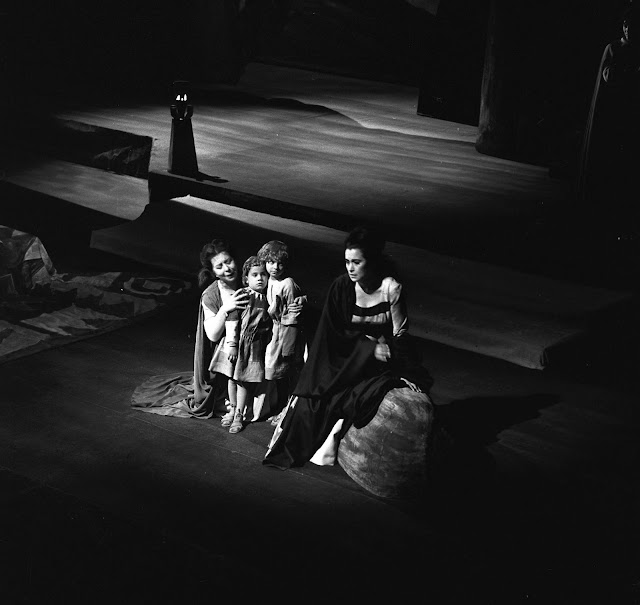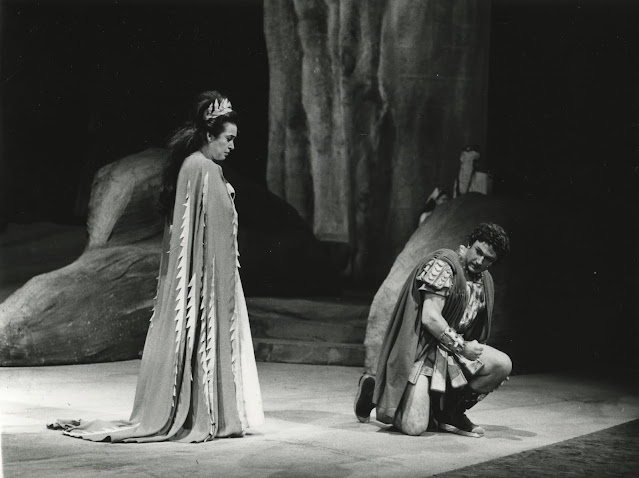NORMA








GENCER ALLA SCALA
NORMA

RADIO FRA I PROGRAMMI DELLA SETTIMANA
La «Norma» presentata
alla Scala da Gavazzeni
mercoledi: ore 20,30 programma nazionale
Fu al teatro alla Scala di Mi lano che la Norma di Vincenzo Bellini ebbe il primo contatto col pubblico. Fu un in contro freddissimo, passato al la storia come uno dei feno meni purtroppo ancora pos sibili di incomprensione della grande arte, ma anche come un episodio legato a meschine gelosie di cantanti, a partiti in favore di questa e di quella primadonna.. Tutte cose che ancora acea dono, nella vita del teatro li rico, e con tanta passionalità da lasciar supporre che siano legate alla natura stessa dell'opera. Ma il ricordo del celebre fiasco di Norma, la sera del 26 dicembre 1831 proprio in quel teatro illustre dal quale viene trasmessa que sta settimana l'edizione diret ta da Gianandrea Gavazzeni - svanisce ormai al contatto con l'opera d'arte. Come svani più di un secolo fa, dopo l'insuccesso della prima rappresentazione, di fronte alla evidenza poetica che la musica di Bellini ha impresso in ogni più riposta fibra della sua opera bellissima, monu mento fra i più alti del suo genio mediterraneo, e docu mento insuperato, forse, del più puro lirismo romantico. Eppure la prima accoglienza del pubblico milanese alla Norma del giovane e già illu stre maestro siciliano fu freddissima; e non si tratta di una leggenda creata ad arte per sottolineare la solitudine – come si dice – di un grande genio della musica.
In una lettera all'amico Florimo, la sera stessa della prima. Bellini così diceva: scrivo sotto l'impressione del dolore; di un dolore che non posso esprimerti ma che tu solo puoi comprendere. Vengo dalla Scala: prima rappre sentazione della Norma Lo crederesti... Fiasco!!! fiasco!!! solenne fiasco!!!
E aggiungeva: I miei progno stici andarono falliti e le mie speranze deluse. Ma invece. Vincenzo Bellini non si era sbagliato: basto che il pubblico, fin dalla sera successi va si presentasse disarmato di fronte alla sublime e semplice bellezza della sua ope ra, per esserne conquistato; e il maestro poteva scrivere. po chi giorni dopo, che la Nor ma aveva fatto furore...
Nell'attuale edizione scalige ra la soprano Leyla Gencer, Giulietta Simionato e Bruno Prevedi hanno preso il posto che già un secolo fa appa riva circonfuso di leggenda- di nomi come quello della Pasta, della Grisi e di Donzelli Giuditta Pasta, diceva Belli ni, è un angelo: la mez zosoprano Giuditta Grisi e il tenore Domenico Donzelli erano fra i più grandi astri del canto italiano: e pensan de a questi nomi si capisce perché la Norma sia restata un'opera da grandi cantanti. che non sopporta mezze misure, adattamenti e mediocrità.
Fatta soprattutto per essere cantata (e non sembri un assurde), per risolvere nella purezza di un disegno melodico, mirabilmente ritmato in ogni frammento, anche i più atroci spasimi e le più sottili vibrazioni dell'anima (senza ricorrere alla meraviglia. di un vario, raffinato e conturbante commento orchestra- le, condotto invece con essen ziale semplicità di mezzi), Norma ha la compostezza di una figurazione greca. Si ascolti Casta diva, nel prime atto, il Dormopo en trambi all'inizio del secon do, il celebre duetto. In mia mano alfin tu sei e l'aria finale Qual cor tradisti se siamo teptati a pericolosi confronti con altre forme di arte che non siano la musica. non possiamo trovare tanta purezza se non nei lirici greci e. forse, nella poesia di Giacomo Leopardi.
Nel disegno aureo delle melodie belliniane è condensato tutto un mondo di emozioni: l'amore di Norma per Pollione e per i suoi figli, l'affetto e l'atroce dubbio nei confronti di Adalgisa, fino al clima religioso ed eroico del sacris cio sul rogo dell'appassionata sacerdotessa, chiusi – musicalmente parlando; - ma si collegano gli duetti e concertati – in una magica coralita di individuazioni dramatiche . [Leonardo Pinzauti]
Photos: Il mezzosoprano Giulietta Simionato
(Adalgisa) e il tenore Bruno Prevedi (Pollione) in una drammatica scena della
Norma al Teatro alla Scala. Sotto: il soprano Leyla Gencer, protagonista del
capolavoro di Vincenzo Bellini
Con Norma torna alla Scala un titolo leggendario, che ha
segnato la storia del nostro Teatro non solo da un punto di vista musicale. Fin
dal debutto nel 1831, l’opera vede in locandina alcuni dei nomi simbolo del
Piermarini: Alessandro Rolla a capo dell'orchestra, Sanquirico alle scene,
Giuditta Pasta, Domenico Donzelli e Giulia Grisi in palcoscenico. Accolta con
freddezza la prima sera, l’opera conquista presto il pubblico, tanto che viene
ripresa 35 volte solo nella prima stagione.
With Norma, a legendary title returns to La Scala –
one that has left a profound mark on the history of our Theatre not only from a
musical perspective. Since its premiere in
1831, the opera featured some of the most iconic names associated with La
Scala: Alessandro Rolla leading the orchestra, Sanquirico designing the sets,
and on stage Giuditta Pasta, Domenico Donzelli and Giulia Grisi. Initially
received with indifference, the opera soon won over audiences, with 35
performances in its first season alone.
COMPLETE RECORDING
Recording Excerpts
Norma: Leyla
Gencer
Pollione: Bruno Prevedi
Live from Teatro
alla Scala di Milano, 1965.01.13
This is the infamous Norma in La Scala which caused a mayhem when it was announced. Both the theatre and Gencer received...not so nice wishes from some Callas fans. From her autobiography, "How dare you take on Norma after Callas!", "Just know that we will ruin you on stage. You will never be able to step on it again!", "People who want to see the end of Leyla Gencer can watch Norma!"...."You sing Norma and you die!" La Scala was also starting to feel unease. Previous year Mirelle Freni was booed off stage because she sang another "Callas role", Violetta. When Gencer arrived at La Scala on the night of the performance, there were reports of people who came with eggs and tomatoes. She smiled when she heard the news but inwardly doubts were starting to creep up. Gencer, who normally attacked the stage like a caged animal was at defence when she appeared as Norma. She was shy and cautious. These feelings escalated when it was time for Casta diva. She feared the worst from the audience but met with applause. She was starting to relax. No one was leaving like she had feared. They seemed genuinely interested in Gencer's Norma. And the final scene. Gencer, was overwhelmed with mix of emotions. Sadness, fear, doubt, surprise, relief, joy...Not only because she was playing Norma but the months leading up to this night. Deh, non volerli vittime is the ultimate peak of these emotions. She was crying. Bruno Prevedi was crying. Nicola Zaccaria was crying. Choir was crying....and La Scala audience was crying. It was a night of triumph.
FROM CD BOOKLET
Her repertoire is a very large one: from the "soprano leggero" roles in the early years, to the pathos-ridden and the "drammatico di agilità" ones, from "belcanto" to contemporary opera (Prokofiev's Fiery Angel, Britten, Poulenc, Menotti, Roccal (Maggio Musicale Fiorentino, 1966) to the neoclassical operas - from Cherubini (Medea, Venice 1968), Spontini (La Vestale, Agnese di Hohenstaufen) Mayr (Medea in Corinto) Pacini (Saffo) to Mozart. A contemporary singer as far as sensitivity and strict respect of the text, she was a protagonist in both the Verdi and Donizetti Renaissance: she had in her repertoire 18 Verdi's operas, among which the "rediscovered" I Due Foscari (Venice, 1957); La Battaglia di Legnano (Firenze, 1959); Jerusalem (Venezia, 1963) as well as titles rarely performed at that time such as Macbeth (from 1960 in Palermo, conductor Vittorio Gui, until 1980) and Attila (Florence 1972, conductor Riccardo Muti). She was a forerunner of the Donizetti Renaissance, with the outstanding rediscovery of Roberto Devereux (Naples 1964), Lucrezia Borgia (Naples 1967), Belisario (Venice 1969), Caterina Cornaro (Naples 1972), Les Martyrs (Bergamo 1975) besides popularizing Anna Bolena (from 1957), completing the tirade of her Donizetti's queens. As for Bellini, she rediscovered Beatrice di Tenda and sang Norma in a number of thrilling performances (from La Scala, 1965, conductor Gavazzeni, to Verona, Barcelona, Lausanne, Buenos Aires...)
Gencer's inquisitiveness led her to rediscover, in her recitals, rare pages of refined authors. Among her favourite’s programs, the 19 Polish songs op. 47 by Chopin, in the original language, with pianist Nikita Magaloff.
In the Eighties she started teaching, as the artistic director of Milan As.Li.Co. (from 1983) and at present as artistic consultant and teacher of musical interpretation at the Singing Academy of the Teatro alla Scala (from 1997).















































































































































.PNG)
.PNG)
.PNG)
.PNG)
.PNG)
.PNG)